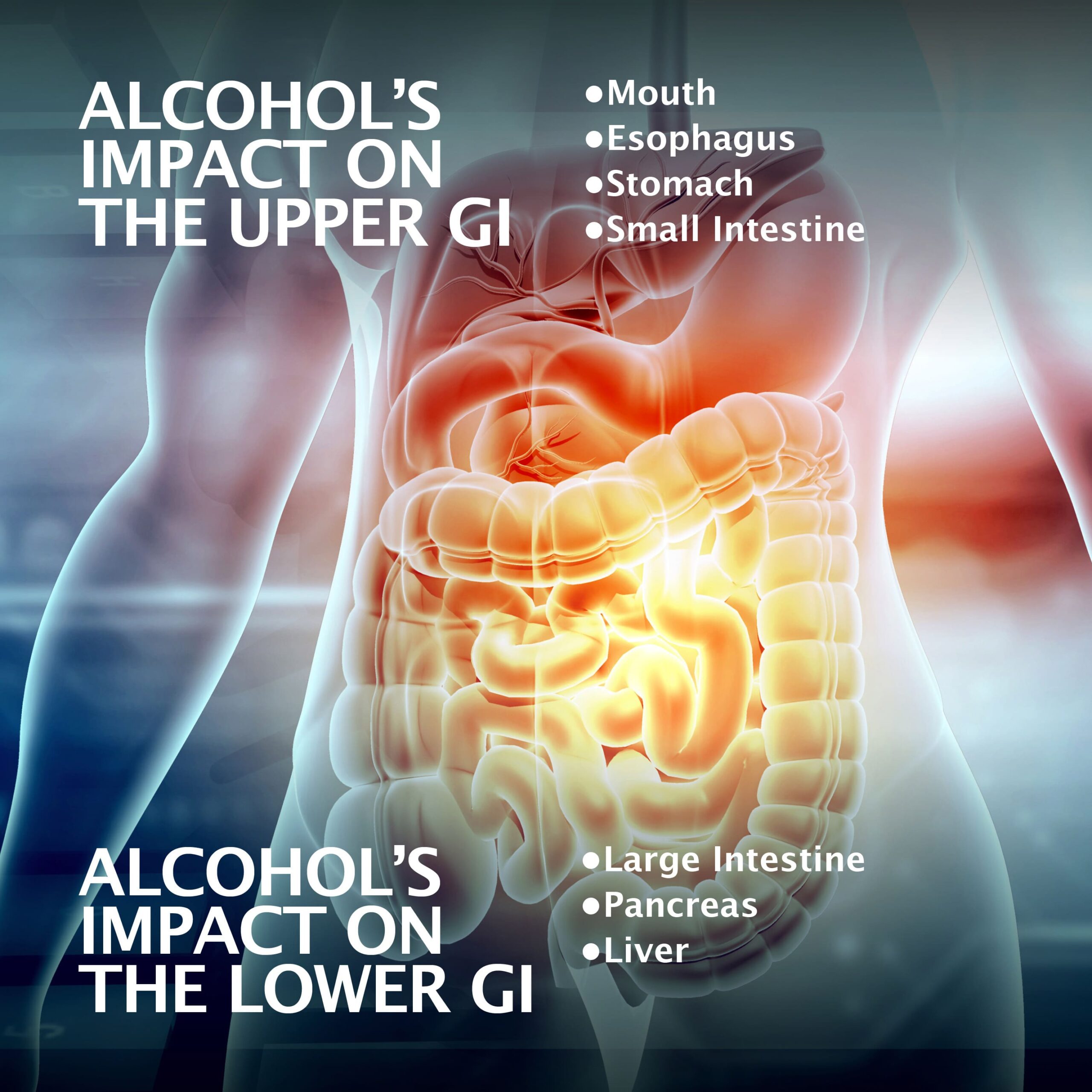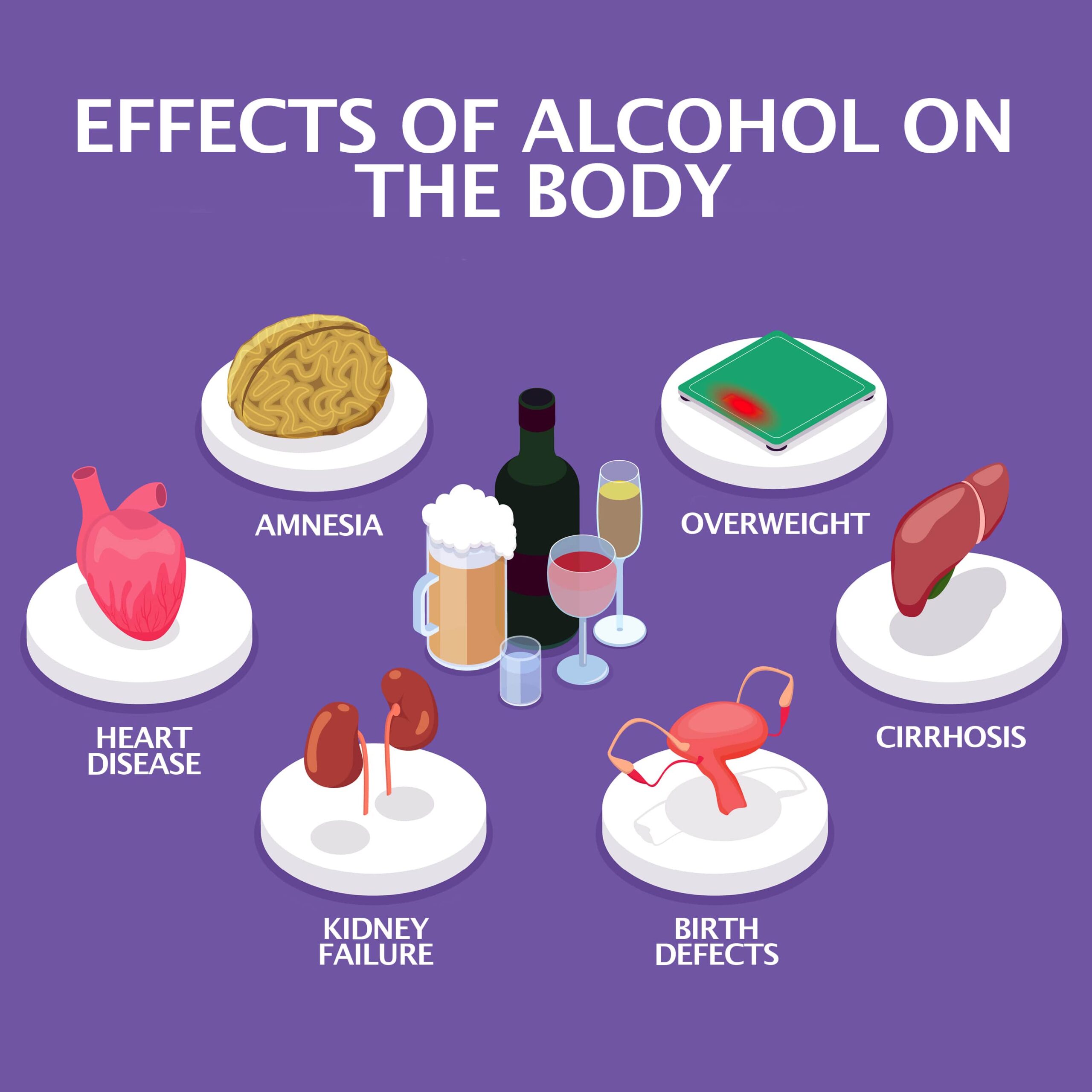
Top Things to Keep in Check When It Comes to Your GI Tract and Alcohol

April is National Alcohol Awareness Month. It’s a good time to stress the negative impact overindulging in the substance can have on the body and, in particular, the digestive system.
National Alcohol Awareness Month first started in 1987 and was created by the National Council on Alcohol and Drug Dependence, which is abbreviated as NCADD.
Members of this organization were concerned with the level of alcohol abuse seen in college students and young people and took it upon themselves to educate them and their families on the dangers of overindulgence and offer resources for those needing help.
The Severity of The Problem
Recent research demonstrates that alcohol overuse or abuse extends well beyond young adults and youths. Data gathered in 2018 concluded that more than 14 million Americans had an alcohol use disorder and consumed at least four to five drinks per day.
Nearly 90,000 people die each year from some type of alcohol-related problem. Alcohol is believed to cost the national economy almost $250 million in issues such as medical treatment, associated illnesses, accidents, and missed work time.
Today, National Alcohol Awareness Month has blossomed into a widespread effort in which many agencies, establishments, and organizations throughout the country work together to do tasks including:
- Raising the stigma associated with excessive alcohol intake or abuse.
- Stressing the impact consistent drinking could have on your life.
- Teaching loved ones to recognize the signs and symptoms that a relative might display with a drinking problem.
- Underscoring the common causes of excessive alcohol intake.
- Identifying productive and safer alternatives to drinking.
Brief Discussion on The Gastrointestinal Tract
Your digestive system is an expansive and complex network carrying out critical bodily functions such as breaking down the foods and drinks you consume into digestible particles, extracting the nutrients contained in these products the rest of the body requires to operate functionally and produce and expel waste materials.
Alcohol’s Impact on Your Digestive Tract
The digestive tract is divided into two key sections: the upper and lower regions.

Alcohol’s Impact on the Upper GI
The top part of your digestive system is classified as the upper GI and contains components such as the mouth, esophagus, stomach, and upper reaches of the small intestine.
- Mouth – Alcohol can have a significant impact on the mouth. This is because it has not yet been diluted when coming into contact with your teeth and gums, exposing them to alcohol in its most potent form. Injuries like sores and lesions are not uncommon in the mouths of those frequently consuming alcohol. Continual usage can also damage teeth and gums, making things like eating difficult. This could result in nutritional deficiencies and the onset of associated illnesses. Continued alcohol usage can precipitate more problems like wounded salivary glands and diminished saliva output, negatively impacting the digestive process.
- Esophagus – The esophagus is the channel transporting food from the mouth to the stomach. Constant alcohol use can gradually erode the lining, leading to pain and possibly dangerous swallowing problems. Drinking could alter the esophagus’s structure, increasing your risk for cancer.
- Stomach – Chronic alcohol intake can have a profoundly negative influence on your stomach. Researchers have found that potent beverages significantly increase acid production. Over time, the corrosive substance can damage the stomach’s lining. Alcohol is believed to slow down digestion times and increase the number of bacteria circulating through the gastrointestinal tract, increasing your risk for infections and other possibly significant health concerns.
- Small Intestine – Nutrient absorption begins in your small intestine. Too much alcohol can wash away nutrients or limit their strength. This could result in significant nutritional problems, growth issues, and a weakened immune system.
Alcohol’s Impact on the Lower GI
Your lower GI is comprised of the lower portions of your small intestine, the large intestine (which includes your colon), the liver, gall bladder, pancreas, rectum, and anus.
- Large Intestine – Researchers maintain that overabundant alcohol intake can expedite how waste moves through your colon. This occurrence can lead to problems like frequent diarrhea.
- Pancreas – Too much alcohol could contribute to developing a serious and potentially life-threatening inflammation called pancreatitis.
- Liver – Unabated use of alcohol can result in liver damage. The substance increases inflammation within the organ and leads to the development of fatty tissue. Either or both of these issues could limit the organ’s effectiveness in helping your body rid itself of hazardous waste products and ultimately result in severe or even lethal complications.

How Much Alcohol Is Safe to Drink Per Day?
Like any potentially harmful vice, alcohol intake should be stopped or indulged in moderation. The Dietary Guidelines for Americans standards, produced by the CDC (Centers for Disease Control and Prevention), stress that men should consume no more than two drinks per day and women no more than one.
Lessening Alcohol’s Impact
Fortunately, you might be able to limit alcohol’s potency through efforts such as:
- Eating Before Drinking – If you plan to visit a bar or some other location, nutritionists and health experts strongly recommend eating ahead of time. Consuming food will not prevent you from getting drunk if you overindulge. But a full stomach can soak up the alcohol and slow its absorption into your bloodstream.
- Consume The Right Food – Certain products like those with healthy fats and proteins delay alcohol absorption. On the flip side, items containing refined carbohydrates such as cookies, rice, and snack foods are typically digested quickly and have no bearing on the alcohol absorption process.
- Drink Large Quantities of Water – One major drinking risk is dehydration. A lack of water inside your body often causes many negative issues. Dehydration could prove especially problematic for the gastrointestinal system. You are firmly encouraged to intake significant amounts of water in both the hours before you plan to drink and especially during a drinking session. This helps your body maintain proper hydration and expedites alcohol’s elimination times.
- Respect Limitations – Above all, you are implored to know your limits. Everyone overindulges from time to time. Parties, momentous occasions, and stressful events can inspire a round of drinking. You might limit alcohol’s impact on your body by knowing your limitations and not exceeding the boundaries.

GI-Friendly Beverages Choices
Consider drinking more GI-friendly beverage choices. Such drinks include:
- Coffee.
- Teas containing flavors like peppermint, lemongrass, and fennel.
- Kombucha.
- Ginger ale.
Above all, drink water. It refreshes you, prevents dehydration, and stimulates optimal digestive tract performance.
Contact Us
If you have been a moderate to heavy drinker and believe you may have associated digestive issues, please contact us. Our practice began more than 15 years ago and has emerged as one of the leading gastroenterology practices in central Florida. We perform several diagnostic procedures using state-of-the-art equipment in a friendly, comfortable, and inviting atmosphere. Patient care is always our top priority. Contact us today!